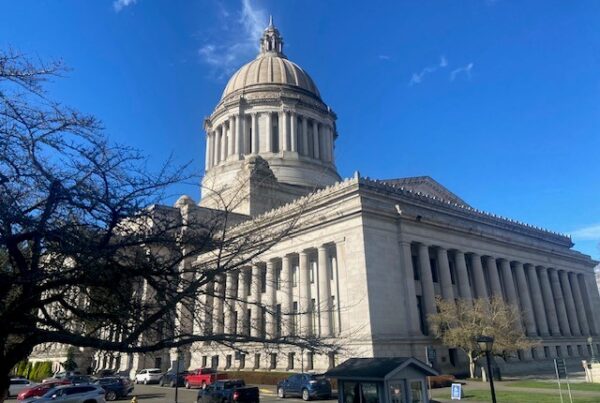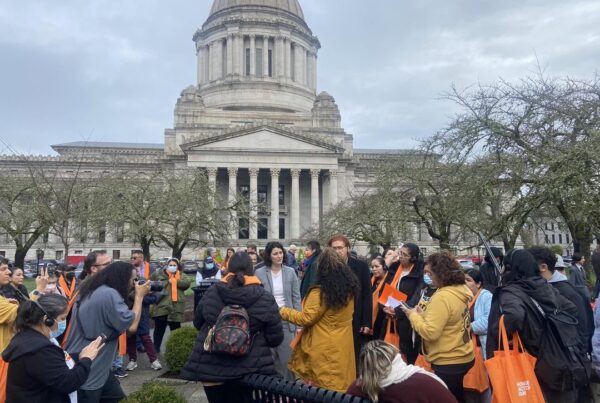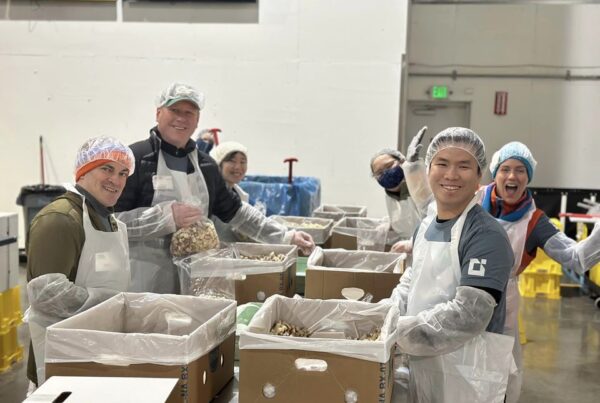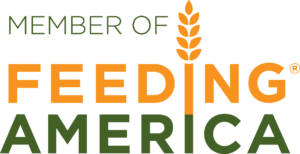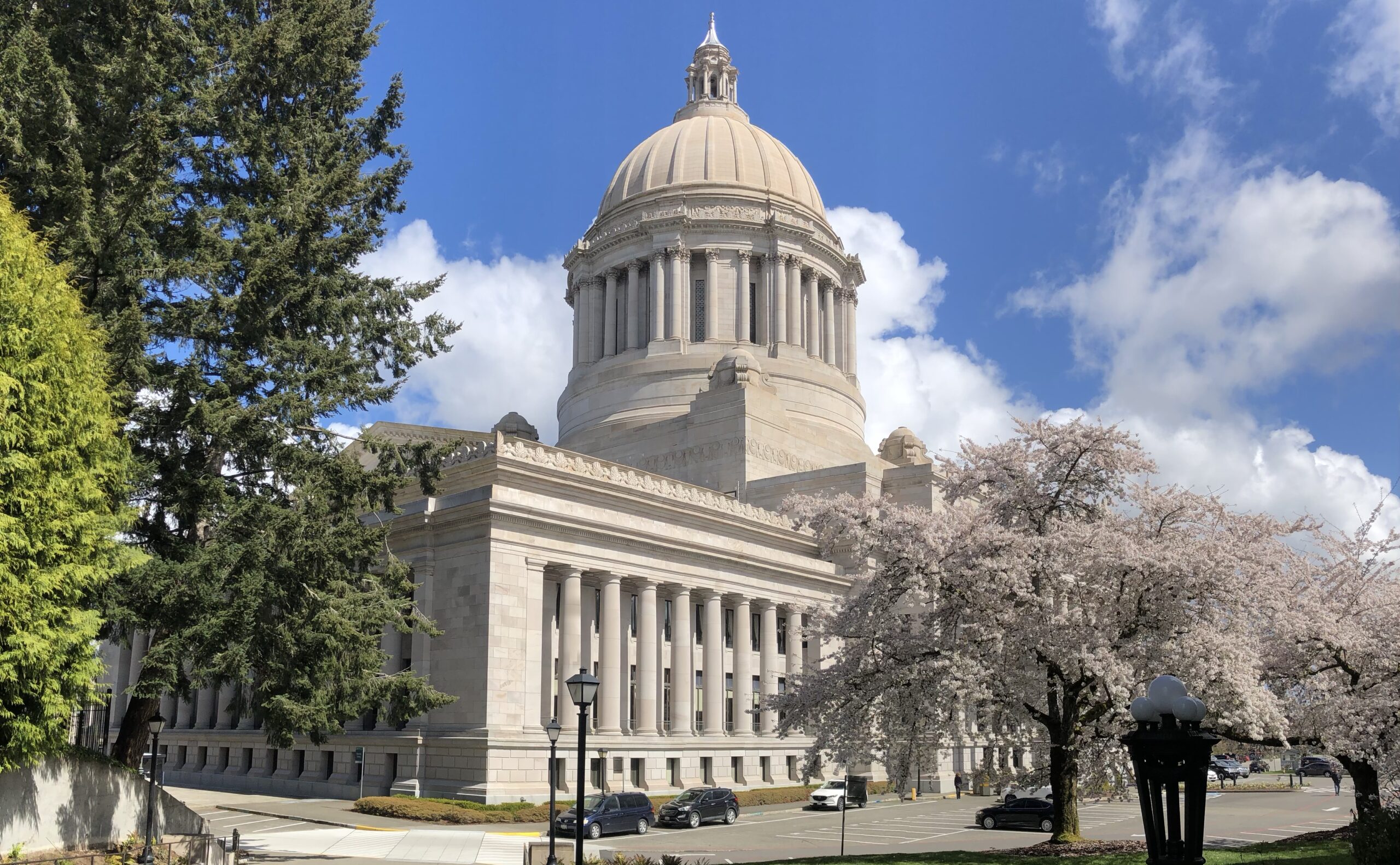
By Aaron Czyzewski
Director, Advocacy & Public Policy
Each year, Food Lifeline sets out to work with legislative champions in Olympia and Washington DC on policies to solve hunger problems, protect successful safety net programs, and secure new investments for hunger relief efforts. We are happy to report progress in all these areas during the 2024 Washington State Session.
Importantly, Food Lifeline recognizes our advocates and supporters, including partners that helped make this body of work possible: Anti-Hunger & Nutrition Coalition, Balance Our Tax Code Coalition, Faith Action Network, Feeding Washington, Northwest Harvest, Racial Equity Team, Second Harvest, Senior Citizens Lobby, Statewide Poverty Action Network, United Way of King County, Washington Anti-Poverty Advocates, Washington Food Coalition, Washington Coalition for Police Accountability, Washington State Department of Agriculture, Washington Student Association, Working Families Tax Credit Coalition, Zero Waste Washington, and the Food Fighters Legislative Caucus.
Highlights from the Supplemental Session
The 2024 Washington State Legislature took additional steps to expand free school meal access to students. This year, by appropriating $45M for the previously passed K-4 expansion and by dedicating $12M for the administrative start-up costs associated with the new created federal Summer EBT meal program long championed by U.S. Senator Patty Murray. Additionally, lawmakers appropriated $12M for senior meal nutrition programs, and $10M for the Emergency Food Assistance Program operated by the Washington Department of Agriculture.
To help the state achieve its climate and wasted food reduction goals, the legislature passed HB 2301, by Representative Beth Doglio, to encourage food donation as part of a package of provisions addressing wasted food reduction and composting. The bill pledges $1.6M of Climate Commitment Act funding for a program to help offset harvesting and transportation costs when Washington growers donate unsold produce into hunger relief. It also calls for the Department of Ecology’s Washington Center for Sustainable Food Management to convene a stakeholder workgroup to recommend statewide best practices for food donation that happens through partnerships between food banks & food pantries and grocers & retailers.
Importantly, the legislature continued to direct significant funding for affordable housing, homelessness, and mental health issues. To a lesser extent, poverty reduction and much needed community investment. The need remains prominent for progressive revenue and tax code reform that creates the economic justice necessary to end hunger.
Equity & Social Justice
Food Lifeline Platform: Food Lifeline will consider policy measures which focus on racial equity & social justice for vulnerable and low-income children, adults, and seniors, with emphasis on families of color, immigrant, and under-resourced communities.
- Nothing About Us Without Us Act—SUPPORT legislation to require representation of lived and living experience on task forces, workgroups, and advisory committees that report to the Legislature on issues affecting underrepresented populations.
Outcome: WIN. HB 1541, Rep Darya Farivar
- Traffic Safety for All—SUPPORT to end traffic stops for nonmoving violations and provide grants that help people comply with the law and avoid low-level violations.
Outcome: LOSS. HB 1513, Rep Chipalo Street
- AG Investigations & Reform—SUPPORT legislation to empower the Attorney General’s Office to investigate and act on patterns and practices of misconduct at law enforcement agencies.
Outcome: LOSS. HB 1445, Rep Drew Hansen
- Independent Prosecutor—SUPPORT legislation creating a state office to work with the Office of Independent Investigations for fair, credible, and transparent prosecutions.
Outcome: LOSS. HB 1579, Rep Monica Stonier
Poverty
Food Lifeline Platform: Food Lifeline will consider policy measures that end conditions of poverty, especially concerning household stability, affordable housing, living wage employment, and related essential needs.
- Guaranteed Basic Income—ACTIVELY SUPPORT legislation creating a pilot program for direct cash assistance to help Washington residents struggling under unprecedented income inequalities.
Outcome: LOSS. HB 1045, Rep Liz Berry
- TANF—SUPPORT measures to improve access and strengthen TANF program benefits.
Outcome: WIN. HB 2007, Rep Strom Peterson | Extends TANF time limits
Outcome: WIN. HB 1652, Rep Jamica Taylor | Ensures TANF families can keep their child support payments
- State Housing Trust Fund & Rental Assistance—SUPPORT measures to increase affordable housing and assistance for renters at risk of eviction.
Food Systems
Food Lifeline Platform: Food Lifeline will consider measures that improve food justice, food systems resiliency, and operational capacity for hunger relief.
- Emergency Food Assistance Program – Funding—ACTIVELY SUPPORT measures to secure funding for food & operational expenses at local food pantries and food bank distribution centers.
Outcome: WIN. Operating budget| $10M
- Community Food Hubs—SUPPORT measures to direct funding to shared regional facilities for community agencies and local growers to aggregate/store/process food intended for hunger relief, local school systems and other markets.
Outcome: WIN. Capital Budget| $130K for South Seattle Community Food Hub
- Washington Commodities Donation—SUPPORT measures to help fund large-scale procurement of donated Washington commodities for hunger relief efforts statewide.
Outcome: WIN. HB 2301 | $1.6M (one-time, Climate Commitment Act)
- Use Food Well Washington—SUPPORT measures to implement the UFWW Plan recommendations to meet Washington’s 2030 food waste reduction goals and a more resilient food system.
Outcome: Not addressed this session
Hunger, Health, and Wellbeing
Food Lifeline Platform: Food Lifeline will consider measures that positively impact the health of people experiencing hunger in community, educational, work, and healthcare settings.
- Fruit & Vegetable Incentives—SUPPORT increasing state funding to help families on limited budgets afford more fruits and vegetables through DOH’s SNAP Produce Match, SNAP Market Match, and Fruit and Vegetable Prescriptions (Rx) programs.
Outcome: WIN. Operating budget | $100,000 (one-time)
Nutrition Assistance
Food Lifeline Platform: Food Lifeline will prioritize measures that seek to fund and improve equity, access, adequacy, and participation across state and federal nutrition assistance resources.
- School Meals—ACTIVELY SUPPORT measures to expand access to school meals at no student cost (Universal School Meals) and improve access and availability of related school nutrition programs.
Outcome: LOSS. HB 2058/SB 5964, Rep Marcus Riccelli, Sen T’wina Nobles | Died in Committee
- Community Eligibility Provision (CEP)—ACTIVELY SUPPORT measures to expand access to school meals at no student cost and improve access and availability of related school nutrition programs using CEP, a federal school meal program.
Outcome: WIN. Operating budget | $45M to ensure schools have sufficient funding to cover costs incurred under previous legislation that expanded free school meals using CEP
- Hunger Free Campus—SUPPORT legislation to establish criteria for colleges to meet when addressing students’ food insecurity and their access to public benefits.
Outcome: WIN. Operating Budget | $767,000 to fund basic needs navigators at .75 FTE at all college campuses
- Military Family Hunger—SUPPORT measures to improve food security among veteran and military households.
Outcome: WIN. HB 1943, Postsecondary Education Grant Program, Rep Mari Leavitt
Outcome: WIN. SB 5180, Interstate Teacher Mobility Compact, Sen Sam Hunt
Tax Policy
Food Lifeline Platform: Food Lifeline will consider measures that promote equity and fairness in Washington’s tax code and create more opportunity for community investment.
- Working Families Tax Credit—ACTIVELY SUPPORT improvements and expansion of Washington’s tax credit program for households with low and moderate incomes.
Outcome: WIN. Operating budget | $1M for outreach strategies to increase participation among eligible 25–64-year-olds
- Wealth Tax—SUPPORT measures to rebalance Washington’s regressive tax code while providing more revenue for community investments by enacting a 1% levy on wealth held in financial assets, such as stocks and bonds for individuals worth over $1 billion.
Outcome: LOSS. SB 5486, Sen Noel Frame | Died in Committee
- Nonprofits—Monitor legislation impacting tax or regulatory environments for nonprofits.
For questions or additional information, please contact aaronc@foodlifeline.org

